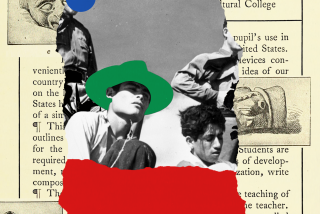Is a U.S. School for Latin Brass Necessary? : Military: The CIA-Guatemala scandal renews an attempt to close the Pentagon-run academy.
- Share via
The Central Intelligence Agency is getting most of the heat for the latest human-rights outrage to emerge from the ugly little wars that continue to plague Central America. It should, since one of the spy agency’s Guatemalan “assets” has been implicated in the brutal murders of a U.S. citizen and the Guatemalan husband of another U.S. citizen. But the CIA is not the only culprit.
A little-known Pentagon operation that trains Latin American military officers also has blood on its hands in this latest tragedy. It’s called La Escuela de las Americas, the School of the Americas. And despite a highfalutin’ name and idealistic-sounding mission, which supposedly includes teaching respect for civilian authority and human rights, it should finally get a hard, critical look in Congress.
According to Rep. Robert Torricelli (D-N.J.), the House Intelligence Committee member who brought the CIA’s Guatemalan scandal to light, a CIA “asset” named Col. Julio Roberto Alpirez is responsible for the June, 1990, killing of Michael DeVine, a native of Illinois who ran a tourist hostel in Guatemala’s northern forests. DeVine apparently stumbled onto a smuggling operation run by Guatemalan officers at a nearby army base under Alpirez’s command.
Alpirez also has been linked to the 1992 death of Efrain Bamaca Velasquez, a leftist guerrilla married to an American, Jennifer Harbury. Of course, Bamaca--however awful his death--could be written off as a casualty of Guatemala’s long civil war, which most experts date from 1954, when a CIA-inspired coup overthrew a leftist president, Jacobo Arbenz. But Bamaca’s widow, a Harvard Law School graduate, wanted answers. She took the case of her husband’s death to Washington, where it eventually caught the attention of Torricelli and Rep. Joseph Kennedy (D-Mass.), who for two years has been trying to eliminate funding for the school from the Pentagon budget.
The elite military training center offers courses in U.S. weaponry, tactics and related skills to Latin American officers and cadets chosen for their career potential. It was established in the Panama Canal Zone in 1946 and moved to Ft. Benning, Ga., in 1984. Its stated mission is to foster military professionalism and cooperation among the American republics. But, as is clear from its date of birth, the school also had a role in keeping the communist threat at bay during the Cold War.
The notorious Col. Alpirez not only had close ties with the CIA; he also attended the School of the Americas, in 1970 and ’89. As such, he is on a list of alumni whose reputations are, to say the least, somewhat dubious. Among the most notable: Gen. Raoul Cedras, the leader of the Haitian coup ousted last year by U.S. forces; Gen. Hugo Banzer, dictator of Bolivia from 1971 to ‘78; Gen. Manuel Noriega, the Panamanian dictator now doing time in this country for drug trafficking; Col. Roberto D’Aubuisson, the death-squad leader in El Salvador who ordered the 1980 assassination of Archbishop Oscar Romero. Other Salvadoran alumni include three of the soldiers who raped and murdered four U.S. nuns in 1980, 19 soldiers who took part in the 1989 murder of six Jesuits, and 10 of the 12 officers implicated in the 1981 massacre of 900 peasants at the village of El Mozote.
Alumni of the school have also taken part in military coups in Peru, Ecuador and Argentina, including the “dirty war” of the 1970s in which 4,000 Argentine dissidents died and another 9,000 simply “disappeared,” adding a frightening new term to the Latin American political lexicon. In fact, it is hard to think of a coup or human-rights outrage that has occurred in that region in the past 40 years in which alumni of the School for the Americas were not involved.
It can be argued, as Pentagon and State Department spokesmen have told me in the past, that the school serves a useful purpose. After all, 50,000 Latin American soldiers have attended over the years, and not all of them took part in coups or massacres. But the Cold War is over; it’s time to rethink the School of the Americas.
Kennedy estimates that the Pentagon is spending $18.4 million on the school this fiscal year, and he intends to introduce an amendment to delete that funding from the next Pentagon budget. Two similar amendments failed in 1993 and ’94. Perhaps with this latest human-rights scandal in Guatemala, and a Republican-controlled Congress looking for ways to save money, Kennedy’s quixotic effort may finally succeed. Here’s hoping it does.
More to Read
Sign up for Essential California
The most important California stories and recommendations in your inbox every morning.
You may occasionally receive promotional content from the Los Angeles Times.













